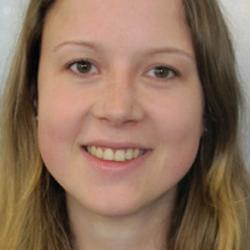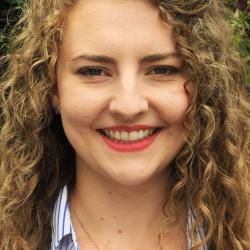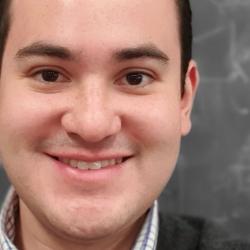Debora Sijacki: Reader in Astrophysics and Cosmology

After my undergraduate degree at the University of Padova, Italy, I completed my PhD studies at the Max Planck Institute for Astrophysics in Garching, Germany for which I was awarded the Otto Hahn Medal for outstanding scientific achievement by the Max Planck Society. I then spent three years as an STFC Post doctoral Fellow at the IoA before taking up a Hubble Fellowship at the Center for Astrophysics, Harvard University. I returned to join the academic staff at IoA in 2013 and got awarded an ERC starting grant in 2015. My main research interest lies in the theoretical understanding of the formation and evolution of cosmic structures. I also currently chair the Project Management Board of DiRAC, the UK national High Performance Computing facility.
Ghina Halabi: Post Doc

I joined the IoA as a postdoc after receiving my PhD from the American University of Beirut. I’m a Junior Research fellow at Wolfson College and a course supervisor at Churchill College. My research is mainly focused on the evolution of stars, their interactions with nearby companions and the element formation in their interiors. I use evolution codes to model stars and compare their predicted properties to a broad range of observations. I also study how stellar evolution is affected by duplicity and fast rotation.
A perennial seeker of opportunities for action and social impact, I founded Scheherazade Speaks Science, an award-winning science storytelling platform that makes science accessible and promotes the visibility of women scientists. Being the first person to obtain a PhD in astrophysics from a Lebanese institution highlights my duty as a role model and inspires my gender advocacy work in STEM. I champion gender equality and representation in STEM through my role in the Postdocs of Cambridge Society as University Representation & Policy Officer, the Equality & Diversity committee at the IoA and as co-chair of the Astro-postdoc committee. I represented the IoA at the Women in Astronomy in Texas and the United Nations Expert Meeting on Space for Women at the UN in New York.
Jason Sanders: Post Doc

I studied Natural Sciences in Cambridge as an undergraduate before obtaining my PhD in Theoretical Astrophysics from the University of Oxford. I gladly returned to Cambridge in 2014 to work as a PostDoc in the IoA. During my time here I have been awarded a Junior Research Fellowship at Christ’s College and a Leverhulme Early Career Fellowship. My research focusses on the structure, formation and evolution of the Milky Way. Now is a very exciting time for Galactic research as the Gaia satellite is providing a full 3D map of the Milky Way. In particular, I am interested in the dynamical composition of the central Galactic bar and the correlations between chemistry, dynamics and stellar ages for stars in the Galactic disc. Cambridge is a fantastic place to be analysing this data as there is a large, diverse group of fellow researchers as well as many people directly involved in producing the Gaia data.
Thomas Wevers: Post Doc

Originally from Belgium, I studied physics as an undergraduate before moving to a masters in astronomy at KU Leuven. For my master thesis I studied the circumbinary disks of post-AGB stars by comparing models of disk emission to their observed broadband spectral energy distributions. It turns out that I am more interested in observations and high energy astrophysics, so I started a PhD in Nijmegen (NL) trying to use Gaia data to search for fast (and generally explosive) optical transients. Due to the short lifetime of a PhD compared to space missions like Gaia (and the delays that generally accompany such missions), I ended up searching for stellar mass black holes in quiescent low mass X-ray binaries, before switching mass ranges and studying supermassive black holes using tidal disruption events. It goes to show that just because you start with some particular project in mind, you might end up doing completely different (but equally exciting) science. As a post-doc at the IoA I'm continuing to study tidal disruption events and their host galaxies using observations at X-ray, UV, optical and radio wavelengths, to try to map and understand the extreme physics that occurs in the aftermath of these events.
Sophie Koudmani: Ph.D. student
Originally from Germany, I came to the UK to study Physics at Oxford. Having enjoyed both astrophysics and fluid dynamics, I decided to work on hydrodynamic simulations of galaxies for my PhD. The IoA is an excellent place for numerical projects as we have access to a variety of high performance computing facilities and a great range of expertise in the simulators group. In addition to our weekly group meetings, we also have weekly group lunches providing plenty of opportunities to discuss our research and to share experiences as well as best practices.
Anjali Piette: Ph.D. student

I grew up in Durham, but in a mixture of Belgian, French and Indian cultures. I've been in Cambridge since the start of my undergraduate studies... and loved it so much that I stayed on for a PhD! The IoA in particular is where I have worked and studied for the past three years, and its welcoming and lively atmosphere has really shaped who I am as a researcher today. I now work on characterising exoplanet and brown dwarf atmospheres based on their emission spectra. It's a really exciting area, and Cambridge is a great place to do it with its large community of exoplanet researchers. I feel very lucky to be in such an inspiring environment!
Amy Rankine: Ph.D. student
I grew up in a small town on the East coast of Scotland and was the first in my family to attend university. I studied for my undergraduate degree in Astrophysics at the University of St Andrews, graduating in 2017, after which I moved down to Cambridge to start my PhD in Astronomy. I'm now researching quasar outflows using ultraviolet and optical spectra. We have a fortnightly quasar group meeting where we can share our work in progress in a relaxed environment to get feedback and help with our ideas. The IoA is an extremely friendly and inspiring place to work and I couldn't be happier about my experience as a PhD student so far.
Luis Welbanks: Ph.D. student
My experience in life taught me not to conform with the stereotypes imposed by those in power. I believe that every person can achieve greatness and should be allowed to fulfill their dreams. Being a Mexican, I see science as the means to take down the walls built by those trying to divide us, empower people to make informed decisions and appreciate that all lives have equal value. My passion for science transformed into a deep curiosity to understand our universe and the conditions that allowed for our existence. My desire to understand the world took me from Mexico to Canada where I became the first person at the University of Calgary to finish two majors in physics and astrophysics in four years. Now in Cambridge, I am honoured to join Dr. Nikku Madhusudhan and his group in studying and characterizing the atmospheres of exoplanets. We are as close as we have ever been to understanding our place in the universe and the uniqueness of our existence. The quest for habitable planets thrills me and I believe that this excitement is shared with the rest of humanity. My path to becoming a Gates-Cambridge scholar has not been linear and I owe a large amount of gratitude to every person who believed in me and helped me become who I am. I hope this opportunity will allow me to inspire others to pursue their goals and create scientific opportunities in Latin America.



